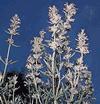- hyssop
-
/his"euhp/, n.1. any of several aromatic herbs belonging to the genus Hyssopus, of the mint family, esp. H. officinalis, native to Europe, having clusters of small blue flowers.2. any of several related or similar plants, esp. of the genera Agastache or Gratiola.3. Bible. a plant, perhaps the origan, whose twigs were used in ceremonial sprinkling.[bef. 900; ME, OE ysope < LL ysopus, for L hyssopus < Gk hýssopos < Sem (cf. Heb ezobh); conformed to L or Gk from mid-16th century]
* * *
Small perennial garden herb (Hyssopus officinalis) of the mint family, native to the area from southern Europe east to Central Asia and naturalized in North America.Its flowers and evergreen leaves have long been used as a flavouring for foods and beverages and as a folk medicine for nose, throat, and lung afflictions. The plant has a sweet scent and a warm, bitter taste. It is used to flavour both sweet and savory foods, and such liqueurs as absinthe. Hyssop honey is considered especially fine. Hyssop (Hyssopus officinalis)Walter Dawn
Hyssop (Hyssopus officinalis)Walter Dawn* * *
▪ plant(Hyssopus officinalis), garden herb of the mint family (Lamiaceae, or Labiatae) whose flowers and evergreen leaves have long been used as a flavouring for foods and beverages and as a folk medicine. The plant has a sweet scent and a warm, bitter taste. A strong tea made of the leaves and sweetened with honey is a traditional remedy for nose, throat, and lung afflictions and is sometimes applied externally to bruises. In the European Middle Ages hyssop was a stewing herb; its modern uses are for flavouring meats, fish, vegetables, salads, sweets, and such liqueurs as absinthe. Honey made from hyssop pollen is considered especially fine. The leaves contain oil of hyssop, a volatile oil (essential oil) used by perfumers.Hyssop is a small perennial plant about 0.5 m (1.5 feet) high with slim, woody quadrangular stems and narrow, elliptical, dotted leaves, about 2 to 3 cm (0.8 to 1.2 inches) long and less than 1 cm wide, that grow in pairs on the stem. Long, leafy, half-whorled spikes of little flowers (coloured violet-blue, pink, red, or white) blossom from June to September. A native of the area ranging from southern Europe eastward to Central Asia, hyssop has become naturalized in North America.The hedge hyssop comprises herbs of the genus Gratiola, belonging to the Scrophulariaceae family, that are native to marshy lands throughout Eurasia and North America. Gratiola officinalis, of Europe, has cylindrical stems and leaves twice the size of those of true hyssop. Its flowers are solitary and located in the axils of the leaves. The herb is almost odourless but has a bitter, nauseous taste. Small quantities taken internally act as a purgative, diuretic, and emetic. In Switzerland it grows abundantly in damp pastures and is dangerous to cattle.Ezov, the hyssop of the Bible, a wall-growing plant used in ritual cleansing of lepers, is not Hyssopus officinalis, which is alien to Palestine; it may have been a species of caper or savory.* * *
Universalium. 2010.
